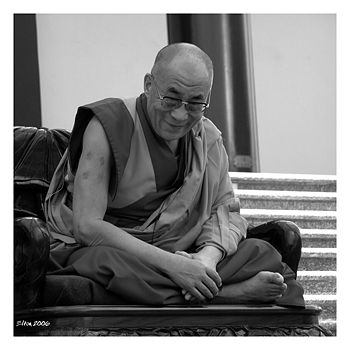Tenzin Gyatso: Difference between revisions
imported>Meg Taylor (rm redundant categories) |
John Leach (talk | contribs) m (Text replacement - "China" to "China") |
||
| Line 5: | Line 5: | ||
==Early life== | ==Early life== | ||
Llhamo Döndrub<ref name=name>The Literal meaning of Llhamo Döndrub is ''wish-fulfilling Goddess''</ref> was born on a straw covered dirt floor on July 6, 1935<ref name=birth>Marcello, Patricia Cronin - The Dalai Lama: A Biography, page '''1''', ISBN 0313322074</ref> to Choekyong and Diki Tsering, relatively wealthy farmers of the village of [[Takster]] in the [[Amdo]] region of [[Qinghai]] province, | Llhamo Döndrub<ref name=name>The Literal meaning of Llhamo Döndrub is ''wish-fulfilling Goddess''</ref> was born on a straw covered dirt floor on July 6, 1935<ref name=birth>Marcello, Patricia Cronin - The Dalai Lama: A Biography, page '''1''', ISBN 0313322074</ref> to Choekyong and Diki Tsering, relatively wealthy farmers of the village of [[Takster]] in the [[Amdo]] region of [[Qinghai]] province, China. His parents, and all the other village inhabitants of 20 families, made a precarious living growing barley, buckwheat and potatoes. His parents had 16 children, of which he was the fifth eldest of seven who survived childhood. His elder brother, [[Thupten Jigme Norbu]], was recognised as the re-incarnation of the High Lama, [[Takster Rinpoche]]. His eldest sister, Tsering Dolma, would later depict their mother in the film [[Seven years in Tibet (1997 film)|Seven years in Tibet]]. His other brothers and sisters are Gyalo Thondup, Lobsang Samten, Jetsun Pema, and Tendzin Choegyal. | ||
==Life as Dalai Lama== | ==Life as Dalai Lama== | ||
Revision as of 09:10, 28 February 2024
Jamphel Ngawang Lobsang Yeshe Tenzin Gyatso, born Llhamo Döndrub, is the 14th Dalai Lama of the Gelug school of Tibetan Buddhism. He is currently the leader of the Tibetan government in exile, and is a Nobel Peace Prize Laureate.
Early life
Llhamo Döndrub[1] was born on a straw covered dirt floor on July 6, 1935[2] to Choekyong and Diki Tsering, relatively wealthy farmers of the village of Takster in the Amdo region of Qinghai province, China. His parents, and all the other village inhabitants of 20 families, made a precarious living growing barley, buckwheat and potatoes. His parents had 16 children, of which he was the fifth eldest of seven who survived childhood. His elder brother, Thupten Jigme Norbu, was recognised as the re-incarnation of the High Lama, Takster Rinpoche. His eldest sister, Tsering Dolma, would later depict their mother in the film Seven years in Tibet. His other brothers and sisters are Gyalo Thondup, Lobsang Samten, Jetsun Pema, and Tendzin Choegyal.
Life as Dalai Lama
Exile to India
Political stances
Social stances
Human activities
| “ | Peace and survival of life on Earth as we know it are threatened by human activities that lack a commitment to humanitarian values. destruction of nature and natural resources results from ignorance, greed, and a lack of respect for the Earth's living things...it is not difficult to forgive destruction in the past, which resulted from ignorance. Today, however, we have access to more information, and it is essential that we re-examine ethically what we have inherited, and what we are responsible for, and what we will pass on to coming generations. Clearly, this is a pivotal generation. Our marvels of science and technology are matched if not outweighed by many current tragedies, including human starvation in some parts of the world, and extinction of other life forms. We have the capability and responsibility. We must act before it is too late. | ” |
Awards and honours
For more information, see the Catalogs subpage
Tenzin Gyatso has been awarded many times throughout his life, for his spiritual and political work. On December 10, 1989, he was awarded the Nobel Peace Prize. On 22 June 2006 he became one of only four people ever to be recognized with an Honorary Citizenship by the Canadian House of Commons. On October 17, 2007, he was awarded the U.S. Congressional Gold Medal, the highest award in the United States of America.
Criticism
Footnotes
- ↑ The Literal meaning of Llhamo Döndrub is wish-fulfilling Goddess
- ↑ Marcello, Patricia Cronin - The Dalai Lama: A Biography, page 1, ISBN 0313322074
